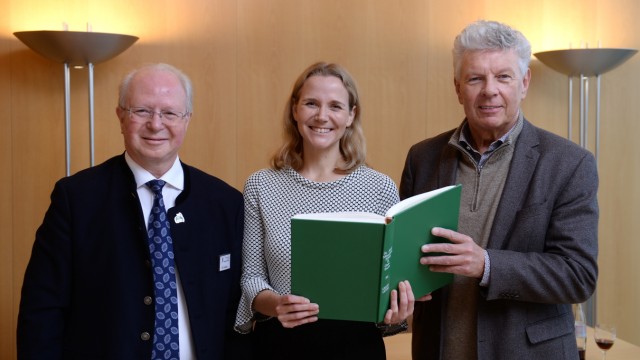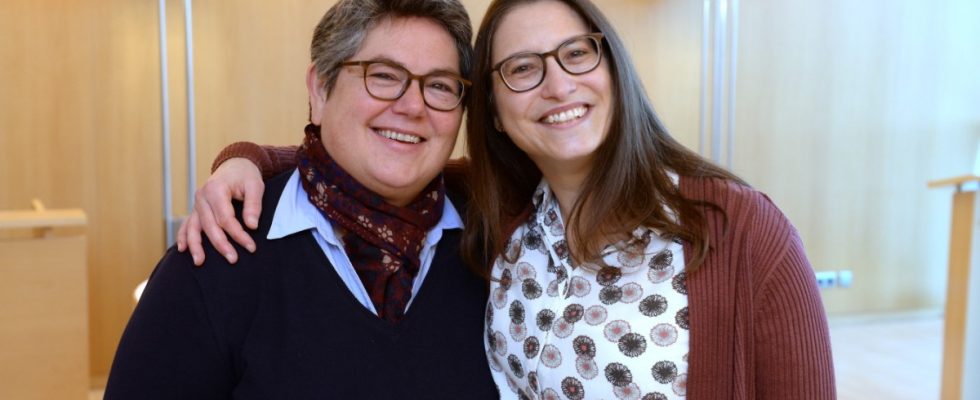The room is paneled with light wood in the style of the 1990s, the curved ceiling is spotted with yellow and blue. In front there is a table with an autumnal arrangement and a large candle on it. Things don’t look as festive as the occasion suggests here in the wedding hall 2 of the district administration department. And yet it is a special place for many couples: this is where they said their vows.
Andrea and Sylvia are standing in this room for the first time in 14 years. On September 2, 2009, their seventh anniversary, the two women registered their civil partnership in the registry office. “It was totally surreal,” says Andrea, looking sideways at her wife. The grin was suddenly there and didn’t go away the whole day. “That evening my face hurt from constantly grinning,” says Andrea. The two women were the first same-sex couple to enter into a civil partnership here.
From 1998 to August 2023, 109,366 heterosexual and 2,119 same-sex marriages were concluded at the Munich registry office. Before marriage was introduced for everyone, same-sex couples established their civil partnerships in 1801. This year the registry office is celebrating its 25th anniversary: “We are celebrating our silver wedding anniversary,” says director Gerhard Benedikt.
Sylvia and Andrea took the subway to their wedding at Rupertstrasse 11. The fact that this was possible was due to the centralization of registry offices around a decade earlier. In 1996, the city council decided to merge four Munich registry offices in order to save costs. Only the Munich-Pasing registry office has remained independent to this day due to historical agreements. As a result of the merger, the office in Munich is now the largest registry office in all of Germany. The district has around 1.4 million inhabitants. On October 13, 1998, the centralized registry office opened its doors for the first time.
On the day of the opening, Andrea Deller also entered the building for the first time. She was the first bride to get married there 25 years ago. “It rained incredibly that day,” she remembers. Her family was present at the marriage, after which a carriage picked up the couple from the registry office. The marriage that Deller concluded 25 years ago lasted five years. Nevertheless, she thinks back fondly on the moment. “It was a special day,” she says. “Busy, but super beautiful.”
Andrea Deller was the first bride to get married in the then new registry office 25 years ago.
(Photo: Robert Haas)

The head of the registry office Gerhard Benedikt (left) together with district administration officer Hanna Sammüller-Gradl and mayor Dieter Reiter.
(Photo: Robert Haas)
The head of the registry office, Gerhard Benedikt, was also there at the opening. The office’s responsibilities have changed over the years, he said. The number of people leaving the church, for example, has been steadily increasing. In 25 years, the registry office has registered 265,146 people leaving the church. The number of registered births also increased until it stabilized last year. There have been 482,021 births compared to a total of 307,420 deaths since 1998.
Certifications, leaving the church, marriages – all of this used to be recorded exclusively on paper. Hundreds of thousands of books have accumulated over the decades, says district administration officer Hanna Sammüller-Gradl. In order to be able to accommodate all the documents, stable floor slabs were installed on the third and fourth floors during construction. In 1998, the registrars switched from typewriters to computers, and since 2013, so-called civil status cases have been recorded using electronic signature cards. However, it will still take years until all papers are digitized. The registry office has been provided with 7.5 temporary positions for this purpose, says Sammüller-Gradl.
The registry office is not only developing technically, social developments are also making themselves felt there, emphasizes Sammüller-Gradl. Officials are currently preparing for the planned introduction of the Self-Determination Act. Among other things, training courses are planned in which gender-appropriate language is practiced.
As before, weddings will continue to be carried out in the registry office – sometimes even by Mayor Dieter Reiter (SPD). “Then I’m sure that I’m doing a meaningful job,” says Reiter. “And it’s just fun.” Reiter therefore marries a couple six to eight times a year. Most recently, for example, he married Günther Sigl, the 76-year-old singer Spider Murphy Gang, and his partner Doris Furtmair. “It’s worked out well so far,” says Reiter: All the couples he married are still together.

